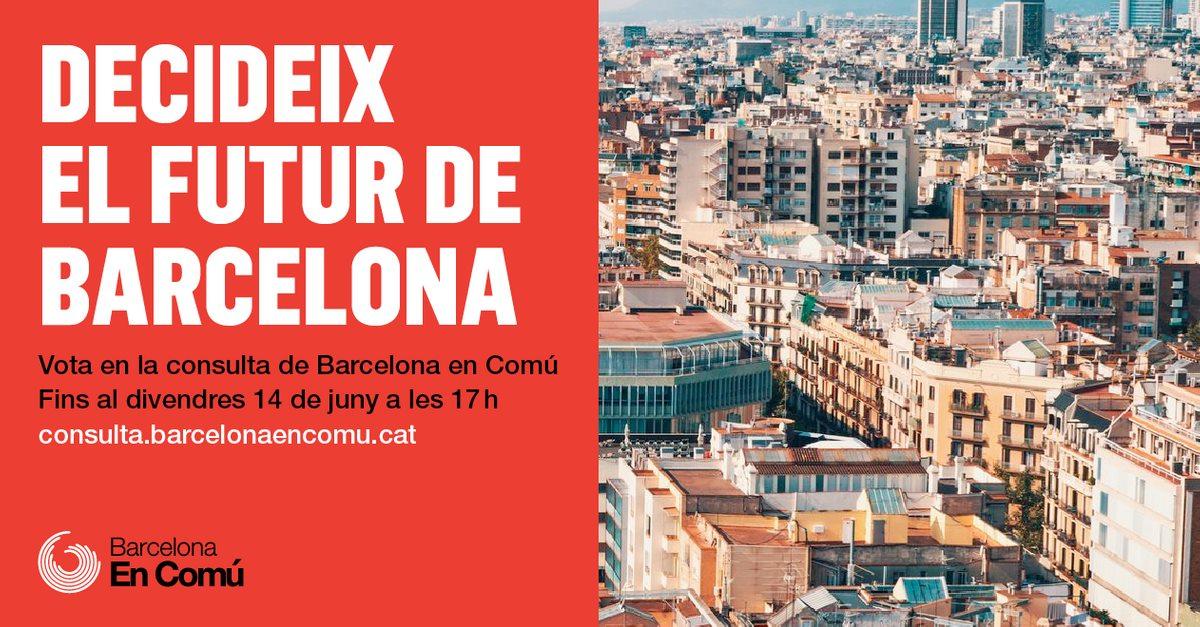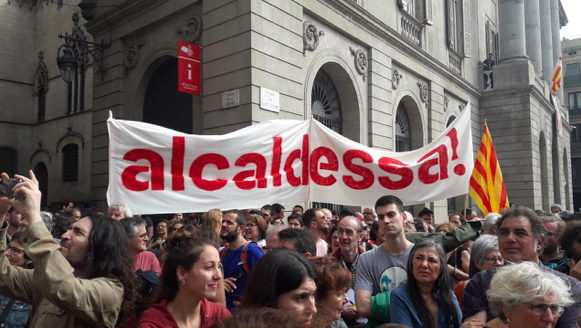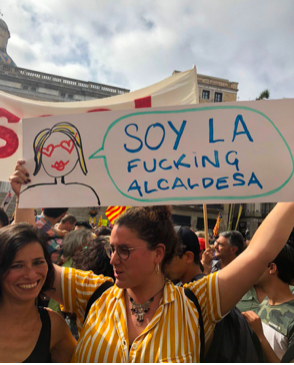Römy Kramer, Executive Director of Guerrilla Foundation, one of the initial promoters of this group and resident in Barcelona, explores in her article how in spite of the great effervescence of Fearless Cities Movement in the last two years, the last municipal elections have been a blow for great exponents of Spanish municipal platforms such as Más Madrid or La Marea Atlántica.
Visit the dedicated session on our website, if you’d like to read more about The Cities of Change Funders Initiative
In June 2017 over 700 activists, councillors, mayors and other folks involved in New Municipalism got together in Barcelona for the first international Fearless Cities Summit. An earlier account of the gathering tried to capture the enthusiastic spirit that accompanied the budding translocal municipalist movement. And a movement it is. Several regional Fearless Cities spun off in the Americas (Valparaiso, New York City) and especially in Europe where we saw Fearless gatherings happening in Warsaw, Brussels, Naples and Belgrade. Beyond that, the movement has sparked the imagination of jaded political activists all over the world who are now rethinking the meaning and practice of municipal politics and establishing municipalist platforms.
The recent municipal elections in Spain at the end of May, however, took the municipalist movement down a peg or two with a couple of important cities formerly ruled by municipalist platforms (Madrid, Zaragoza, Coruña, Pamplona and Palma de Mallorca) losing the mayor’s office. Even in Barcelona, the focus of this article, for a while, it looked like the municipalists would find themselves in the opposition.
The Barcelona Elections
It was a close call defeat which brought Barcelona en Comú into a very tricky situation. The left-republican ERC (Esquerra Republicana de Catalunya) with candidate Ernest Maragall won the elections by not even five thousand votes and gained the same number of seats (10) as Bcn en Comú. The socialist party (PSC) gained 8 seats in the city council where 21 seats are needed to form a majority government.
Two main readings of the election results were advanced in the days to follow. First, Ernest Maragall and others proclaimed the election to be a clear vote for Catalonian independence even though the numbers show that only a total of 39.6% of votes were going to pro-independence parties. The second reading, advocated by Ada Colau and many of her supporters, is that a total of 60.4% of the Catalonian people voted for left parties with the right-wing VOX only gaining a meagre 1.2%.
While this could be considered a victory for liberal, socialist sensibility in a political landscape where the right is rising across Europe, the situation in Catalonia is more complicated. First of all, because ERC and PSC in the past years haven’t necessarily been great examples of truly left politics. Some might even say that their political track record in Barcelona runs against Barcelona en Comú’s progressive politics. Second, the issue of Catalonian independence deeply divides the independentist ERC from the PSC who they hold responsible for jailing or forcing into exile the leaders of the independentist movement. Whereas Barcelona en Comú had tried not to confront the question of Catalonian independence both, ERC and PSC, heavily depended on their position on this issue to attract and grow their constituency.
In this context falls the double-edged offer of Manuel Valls, the former French Prime Minister who also ran for office in Barcelona with the support of the liberal Ciudadanos. Valls gained six council seats and right after the election stated that his party would not enter a coalition but silently support a government of Barcelona en Comú with PSC in order to avoid an independentist mayor in the city council. Turmoil among the ranks of the municipalists was the result, with some members of the first hour threatening to leave the party if this offer were to be accepted. Posts under the #ConVallsNo hashtag quickly emerged and reflect the deep aversion of many who preferred a principled opposition over clinging to power at all cost, tolerated by a neoliberal and some say right Manuel Valls who takes an unrelenting stance on the independence issue.
In true participatory fashion, Barcelona en Comú asked its members to decide about the future course. On the 13th and 14th June all inscribed members of Bcn en Comu (nearly 10k people) were called upon to cast their vote online in favour of one of the two viable options: 1) an alliance of Bcn en Comú with PSC tolerated by Valls and with Ada continuing as the mayor of the city or 2) a joint government with the ERC and Ernest Margall as the new mayor. Delegating crucial strategic decisions to its members in a transparent and participatory fashion using an award-winning open source online decision making tool reveals the true nature of the party and explains why many would hate to see them lose the mayor’s office. A majority of 71.4% of the over 4000 votes cast expressed their wish for Ada Colau to present herself as the new mayor on the 15th of June together with the PSC, tolerated by Manuel Valls. Far less from ideal, the general sentiment was that this pragmatic decision was necessary to keep the progressive government in place. As it usually happens, the ‘purists’ voted against this scenario and criticised Colau for supping with the devil.
 Calling on members to transparently decide about the two coalition options
Calling on members to transparently decide about the two coalition options
Ada Colau herself, advocated for a tripartite left bloc solution of Barcelona en Comú, PSC and ERC until the minute she renewed her term on the 15th of June. Such a coalition, with Maragall as mayor, but forged by the municipalists, would bridge the independentist divide while advancing a set of left policies for the benefit of the people of Barcelona. The amount of yellow paint on the BCN en Comu headquarter and the public reception after her inauguration on the 15th of June suggest that this remains a far-away dream for now. In her commencement speech, Colau again regretted that the tripartite alliance did not materialise. Only minutes later, upon leaving the mayor’s office, she was greeted not only by a crowd of cheering supporters with “alcadessa” banners but also by a ferocious pro-independence crowd swinging Catalonian flags shouting “traitor” (and much worse).
Ultimately achieving this left coalition in the future would confirm one of the main tenets of municipal politics: the emphasis of local impact and relevance over traditional political blocs. Unfortunately, this united left bloc, for now, remains elusive in Barcelona even though coalitions involving the ERC and PSC were possible in some smaller cities (Sant Cugat del Vallès, Figueres and Tàrrega).


Looking Ahead
As Ada Colau braces herself for another four years in office, Barcelona remains the beacon of hope for the left in Europe and beyond, especially now that major Spanish cities like Madrid and Zaragoza lost their citizen platform governments. Considering the extremely difficult environment with the independence issue looming over everything, losing only one seat in the Barcelona city council was maybe not such a bad result for Barcelona en Comú after all. The party refused to make independence the focus of its politics and dealt with the tremendous internal tensions originating from a support base that is deeply divided on this emotional & triggering issue. This speaks for the power of politics that put the city and its people at the centre and has given Barcelona en Comú another four years to build on what they have started.
It also highlights the importance of communicating the details and impact of what is being achieved in a municipality in a way that is not drowned out by the simplistic messaging and populist noise on issues such as Catalonian independence. This might very well be one of the hardest parts. How to keep people excited about your political project, inform them about your day-to-day battles in city hall and share the small and large victories as well as the setbacks? Finding an answer to this question might go a long way in assuring that municipalist platforms are here to stay.
While it is experiencing some growing pains in its Spanish stronghold, the municipalist movement is far from dead. The new situation in cities where the government was lost will force everyone interested in fostering municipalist ideas to take a closer look at those platforms that are in the opposition. We know very little about their strategies and how to best support those activists in generating social impact, shifting the discourse, changing institutions and, ultimately, governing. The Fearless Cities Meeting in Belgrade in early June brought together activists mainly from Eastern Europe, many of whom are not (yet) in the city council or part of the opposition. Supporting these regional networks and also the wider international municipalist network is an essential contribution Foundations can make to allow for joint strategising and assure that the municipality of the future is democratic, habitable, collaborative, caring and fearless. Platforms like Ciudades del Cambio need to be expanded upon and promoted to reach wider audiences, action research needs to be conducted on the strategies and lived practices, and resources for budding municipalists need to be made widely available in order to lower the stress of having to go everywhere in person to share yet another time the story of your municipalist platform that many municipalist activists face.
The recent Barcelona experience is also a case in point for other governing municipal platforms that face difficult decisions as they try to consolidate and stay in office for more than one electoral period. Even though Barcelona en Comú and its leadership are facing massive internal and external critique at the moment, there are four things I believe they did well throughout the process of the past weeks:
- listening to its members in local assemblies,
- taking a clear stance in the leadership on the most preferred option (a tripartite left alliance),
- clearly and transparently communicating about every step in the decision-making process, and
- leaving the final decision to members.
Finally, there is a growing realisation that it is not just the southern parts of Europe that are suffering a housing crisis, are confronted by a set of ravenous, exploitative, and data-hungry tech giants, need to find respectful ways of welcoming new arrivals and deal with the various other social and environmental challenges. As a result, municipalism also catches on in other parts of Europe.
Especially the green/left ruled Amsterdam city council is committed to building a fair digital economy around ideas of data sovereignty, digital participation and urban commons. A Fearless Cities conference is planned in Amsterdam for the coming year to exchange and expand upon the experiences of cities like Barcelona. This summit will constitute a landmark event that has the potential to transfer municipalist ideas beyond the southern and eastern parts of Europe. But also cities like Berlin, where 77k signatures were recently collected to demand a referendum about the expropriation of a massive private housing company, have much to gain from the experiences made elsewhere in building a left politics from below and uniting the various right to the city initiatives to create a relevant force for local politics. And from France, we will soon see a MOOC published to educate the public about municipalism, supported by the Charles Lėopold Mayer Foundation.
The Barcelona Fearless Cities Summit two years ago was a bright spark that connected municipal activists from all over the world. An international group of activists from New York and Valparaiso to Naples, Belgrade, Barcelona and many more have collaboratively kindled it, assuring that the municipal idea grows and is here to stay.
Special thanks to Xavi Ferrer for comments and input on this article.

Leave a Reply
You must be logged in to post a comment.